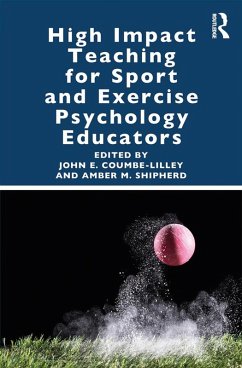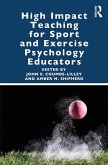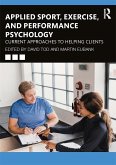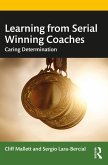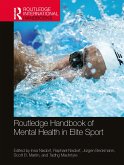High Impact Teaching for Sport and Exercise Psychology Educators (eBook, ePUB)
Redaktion: Coumbe-Lilley, John; Shipherd, Amber
40,95 €
40,95 €
inkl. MwSt.
Sofort per Download lieferbar

20 °P sammeln
40,95 €
Als Download kaufen

40,95 €
inkl. MwSt.
Sofort per Download lieferbar

20 °P sammeln
Jetzt verschenken
Alle Infos zum eBook verschenken
40,95 €
inkl. MwSt.
Sofort per Download lieferbar
Alle Infos zum eBook verschenken

20 °P sammeln
High Impact Teaching for Sport and Exercise Psychology Educators (eBook, ePUB)
Redaktion: Coumbe-Lilley, John; Shipherd, Amber
- Format: ePub
- Merkliste
- Auf die Merkliste
- Bewerten Bewerten
- Teilen
- Produkt teilen
- Produkterinnerung
- Produkterinnerung

Bitte loggen Sie sich zunächst in Ihr Kundenkonto ein oder registrieren Sie sich bei
bücher.de, um das eBook-Abo tolino select nutzen zu können.
Hier können Sie sich einloggen
Hier können Sie sich einloggen
Sie sind bereits eingeloggt. Klicken Sie auf 2. tolino select Abo, um fortzufahren.

Bitte loggen Sie sich zunächst in Ihr Kundenkonto ein oder registrieren Sie sich bei bücher.de, um das eBook-Abo tolino select nutzen zu können.
High Impact Teaching for Sport and Exercise Psychology Educators is designed to address the need for a resource on effective course design, assessment, content delivery, and classroom management that is specific to educators in the field of sport and exercise psychology and to working with the millennial learner.
- Geräte: eReader
- mit Kopierschutz
- eBook Hilfe
Andere Kunden interessierten sich auch für
![High Impact Teaching for Sport and Exercise Psychology Educators (eBook, PDF) High Impact Teaching for Sport and Exercise Psychology Educators (eBook, PDF)]() High Impact Teaching for Sport and Exercise Psychology Educators (eBook, PDF)40,95 €
High Impact Teaching for Sport and Exercise Psychology Educators (eBook, PDF)40,95 €![Applied Sport, Exercise, and Performance Psychology (eBook, ePUB) Applied Sport, Exercise, and Performance Psychology (eBook, ePUB)]() Applied Sport, Exercise, and Performance Psychology (eBook, ePUB)40,95 €
Applied Sport, Exercise, and Performance Psychology (eBook, ePUB)40,95 €![The Mental Impact of Sports Injury (eBook, ePUB) The Mental Impact of Sports Injury (eBook, ePUB)]() The Mental Impact of Sports Injury (eBook, ePUB)39,95 €
The Mental Impact of Sports Injury (eBook, ePUB)39,95 €![The Routledge International Encyclopedia of Sport and Exercise Psychology (eBook, ePUB) The Routledge International Encyclopedia of Sport and Exercise Psychology (eBook, ePUB)]() The Routledge International Encyclopedia of Sport and Exercise Psychology (eBook, ePUB)45,95 €
The Routledge International Encyclopedia of Sport and Exercise Psychology (eBook, ePUB)45,95 €![Learning from Serial Winning Coaches (eBook, ePUB) Learning from Serial Winning Coaches (eBook, ePUB)]() Cliff MallettLearning from Serial Winning Coaches (eBook, ePUB)38,95 €
Cliff MallettLearning from Serial Winning Coaches (eBook, ePUB)38,95 €![Routledge Handbook of Mental Health in Elite Sport (eBook, ePUB) Routledge Handbook of Mental Health in Elite Sport (eBook, ePUB)]() Routledge Handbook of Mental Health in Elite Sport (eBook, ePUB)48,95 €
Routledge Handbook of Mental Health in Elite Sport (eBook, ePUB)48,95 €![Cultural Sport Psychology and Elite Sport in Singapore (eBook, ePUB) Cultural Sport Psychology and Elite Sport in Singapore (eBook, ePUB)]() Nicholas de CruzCultural Sport Psychology and Elite Sport in Singapore (eBook, ePUB)40,95 €
Nicholas de CruzCultural Sport Psychology and Elite Sport in Singapore (eBook, ePUB)40,95 €-
-
-
High Impact Teaching for Sport and Exercise Psychology Educators is designed to address the need for a resource on effective course design, assessment, content delivery, and classroom management that is specific to educators in the field of sport and exercise psychology and to working with the millennial learner.
Hinweis: Dieser Artikel kann nur an eine deutsche Lieferadresse ausgeliefert werden.
Dieser Download kann aus rechtlichen Gründen nur mit Rechnungsadresse in A, B, BG, CY, CZ, D, DK, EW, E, FIN, F, GR, HR, H, IRL, I, LT, L, LR, M, NL, PL, P, R, S, SLO, SK ausgeliefert werden.
Hinweis: Dieser Artikel kann nur an eine deutsche Lieferadresse ausgeliefert werden.
Produktdetails
- Produktdetails
- Verlag: Taylor & Francis eBooks
- Seitenzahl: 296
- Erscheinungstermin: 30. April 2020
- Englisch
- ISBN-13: 9781000059366
- Artikelnr.: 59343000
- Verlag: Taylor & Francis eBooks
- Seitenzahl: 296
- Erscheinungstermin: 30. April 2020
- Englisch
- ISBN-13: 9781000059366
- Artikelnr.: 59343000
- Herstellerkennzeichnung Die Herstellerinformationen sind derzeit nicht verfügbar.
John E. Coumbe-Lilley is Clinical Associate Professor of Kinesiology and Nutrition in the Department of Kinesiology & Nutrition at the University of Illinois at Chicago, USA. Amber M. Shipherd is an Assistant Professor and Coordinator of the Exercise Science/Performance Psychology Program at Texas A&M University-Kingsville, USA. She is also owner and lead mental performance consultant at Next Level Mind Consulting.
Section One: Course Design and Structure
1. Course design for significant learning experiences.
John E. Coumbe-Lilley
2. Gamifying the classroom.
Amber M. Shipherd
3. All hands on deck, there's a problem to solve!: Problem-based learning and service learning approaches in the undergraduate classroom.
Sarah Carson Sackett and Sheila K. Alicea
4. Implementing a teaching case approach in undergraduate sport psychology courses
John E. Coumbe-Lilley
Section Two: Assessments
5. The ABC's of effective assessment strategies
Amber M. Shipherd
6. Pedagogical techniques for assessing student performance using the AAC&U Value Rubrics
Richard L. Miller
7. Playing like you practice: Formative and summative techniques to assess student learning
Melissa Beers
8. Evaluating your own teaching
Amber M. Shipherd
Section Three: Experiential Learning Delivery
9. PRICELESS teaching delivery
John E. Coumbe-Lilley
10. Incorporating research into the undergraduate classroom
Amber M. Shipherd
11. Experiential learning
Chelsea Wooding
12. Teaching in new ways: Visual Thinking Strategies
Marcel S. Yoder
13. Creating powerful classroom experiences on a low budget
Joann Wakefield and Lauren S. Tashman
Section Four: Learning and Technology
14. Ethical considerations in online teaching in sport and exercise psychology
Brandonn Harris and Hillary Cauthen
15. Creating a community of learners in online courses
Andrew P. Driska and Mary-Anne Reid
16. Conducting assessments and classroom activities using technology: A teaching and technology game plan
Tami Eggleston and Amber M. Shipherd
Section Five: Psychosocial Aspects of Teaching
17. Teaching as leadership: Demonstrating leadership in the classroom
Samuel T. Forlenza
18. Creating a motivational learning climate
Viviana Kabbabe-Thompson
19. Teaching with feminist pedagogy
Leeja Carter and Tanya Prewitt-White
Section Six: Teaching Reflections
20. A hero's journey
Peter Kadushin
21. The where of teaching may matter as much as the how: Teaching perspectives from three different institutions
Eric M. Martin, Hannah Bennett, and Christi Johnson
Section Seven: Professional Development
22. Graduate teaching assistant (GTA) training
John E. Coumbe-Lilley
23. Developing your teaching portfolio for hiring and promotion
Sean Fitzpatrick
1. Course design for significant learning experiences.
John E. Coumbe-Lilley
2. Gamifying the classroom.
Amber M. Shipherd
3. All hands on deck, there's a problem to solve!: Problem-based learning and service learning approaches in the undergraduate classroom.
Sarah Carson Sackett and Sheila K. Alicea
4. Implementing a teaching case approach in undergraduate sport psychology courses
John E. Coumbe-Lilley
Section Two: Assessments
5. The ABC's of effective assessment strategies
Amber M. Shipherd
6. Pedagogical techniques for assessing student performance using the AAC&U Value Rubrics
Richard L. Miller
7. Playing like you practice: Formative and summative techniques to assess student learning
Melissa Beers
8. Evaluating your own teaching
Amber M. Shipherd
Section Three: Experiential Learning Delivery
9. PRICELESS teaching delivery
John E. Coumbe-Lilley
10. Incorporating research into the undergraduate classroom
Amber M. Shipherd
11. Experiential learning
Chelsea Wooding
12. Teaching in new ways: Visual Thinking Strategies
Marcel S. Yoder
13. Creating powerful classroom experiences on a low budget
Joann Wakefield and Lauren S. Tashman
Section Four: Learning and Technology
14. Ethical considerations in online teaching in sport and exercise psychology
Brandonn Harris and Hillary Cauthen
15. Creating a community of learners in online courses
Andrew P. Driska and Mary-Anne Reid
16. Conducting assessments and classroom activities using technology: A teaching and technology game plan
Tami Eggleston and Amber M. Shipherd
Section Five: Psychosocial Aspects of Teaching
17. Teaching as leadership: Demonstrating leadership in the classroom
Samuel T. Forlenza
18. Creating a motivational learning climate
Viviana Kabbabe-Thompson
19. Teaching with feminist pedagogy
Leeja Carter and Tanya Prewitt-White
Section Six: Teaching Reflections
20. A hero's journey
Peter Kadushin
21. The where of teaching may matter as much as the how: Teaching perspectives from three different institutions
Eric M. Martin, Hannah Bennett, and Christi Johnson
Section Seven: Professional Development
22. Graduate teaching assistant (GTA) training
John E. Coumbe-Lilley
23. Developing your teaching portfolio for hiring and promotion
Sean Fitzpatrick
Section One: Course Design and Structure
1. Course design for significant learning experiences.
John E. Coumbe-Lilley
2. Gamifying the classroom.
Amber M. Shipherd
3. All hands on deck, there's a problem to solve!: Problem-based learning and service learning approaches in the undergraduate classroom.
Sarah Carson Sackett and Sheila K. Alicea
4. Implementing a teaching case approach in undergraduate sport psychology courses
John E. Coumbe-Lilley
Section Two: Assessments
5. The ABC's of effective assessment strategies
Amber M. Shipherd
6. Pedagogical techniques for assessing student performance using the AAC&U Value Rubrics
Richard L. Miller
7. Playing like you practice: Formative and summative techniques to assess student learning
Melissa Beers
8. Evaluating your own teaching
Amber M. Shipherd
Section Three: Experiential Learning Delivery
9. PRICELESS teaching delivery
John E. Coumbe-Lilley
10. Incorporating research into the undergraduate classroom
Amber M. Shipherd
11. Experiential learning
Chelsea Wooding
12. Teaching in new ways: Visual Thinking Strategies
Marcel S. Yoder
13. Creating powerful classroom experiences on a low budget
Joann Wakefield and Lauren S. Tashman
Section Four: Learning and Technology
14. Ethical considerations in online teaching in sport and exercise psychology
Brandonn Harris and Hillary Cauthen
15. Creating a community of learners in online courses
Andrew P. Driska and Mary-Anne Reid
16. Conducting assessments and classroom activities using technology: A teaching and technology game plan
Tami Eggleston and Amber M. Shipherd
Section Five: Psychosocial Aspects of Teaching
17. Teaching as leadership: Demonstrating leadership in the classroom
Samuel T. Forlenza
18. Creating a motivational learning climate
Viviana Kabbabe-Thompson
19. Teaching with feminist pedagogy
Leeja Carter and Tanya Prewitt-White
Section Six: Teaching Reflections
20. A hero's journey
Peter Kadushin
21. The where of teaching may matter as much as the how: Teaching perspectives from three different institutions
Eric M. Martin, Hannah Bennett, and Christi Johnson
Section Seven: Professional Development
22. Graduate teaching assistant (GTA) training
John E. Coumbe-Lilley
23. Developing your teaching portfolio for hiring and promotion
Sean Fitzpatrick
1. Course design for significant learning experiences.
John E. Coumbe-Lilley
2. Gamifying the classroom.
Amber M. Shipherd
3. All hands on deck, there's a problem to solve!: Problem-based learning and service learning approaches in the undergraduate classroom.
Sarah Carson Sackett and Sheila K. Alicea
4. Implementing a teaching case approach in undergraduate sport psychology courses
John E. Coumbe-Lilley
Section Two: Assessments
5. The ABC's of effective assessment strategies
Amber M. Shipherd
6. Pedagogical techniques for assessing student performance using the AAC&U Value Rubrics
Richard L. Miller
7. Playing like you practice: Formative and summative techniques to assess student learning
Melissa Beers
8. Evaluating your own teaching
Amber M. Shipherd
Section Three: Experiential Learning Delivery
9. PRICELESS teaching delivery
John E. Coumbe-Lilley
10. Incorporating research into the undergraduate classroom
Amber M. Shipherd
11. Experiential learning
Chelsea Wooding
12. Teaching in new ways: Visual Thinking Strategies
Marcel S. Yoder
13. Creating powerful classroom experiences on a low budget
Joann Wakefield and Lauren S. Tashman
Section Four: Learning and Technology
14. Ethical considerations in online teaching in sport and exercise psychology
Brandonn Harris and Hillary Cauthen
15. Creating a community of learners in online courses
Andrew P. Driska and Mary-Anne Reid
16. Conducting assessments and classroom activities using technology: A teaching and technology game plan
Tami Eggleston and Amber M. Shipherd
Section Five: Psychosocial Aspects of Teaching
17. Teaching as leadership: Demonstrating leadership in the classroom
Samuel T. Forlenza
18. Creating a motivational learning climate
Viviana Kabbabe-Thompson
19. Teaching with feminist pedagogy
Leeja Carter and Tanya Prewitt-White
Section Six: Teaching Reflections
20. A hero's journey
Peter Kadushin
21. The where of teaching may matter as much as the how: Teaching perspectives from three different institutions
Eric M. Martin, Hannah Bennett, and Christi Johnson
Section Seven: Professional Development
22. Graduate teaching assistant (GTA) training
John E. Coumbe-Lilley
23. Developing your teaching portfolio for hiring and promotion
Sean Fitzpatrick
